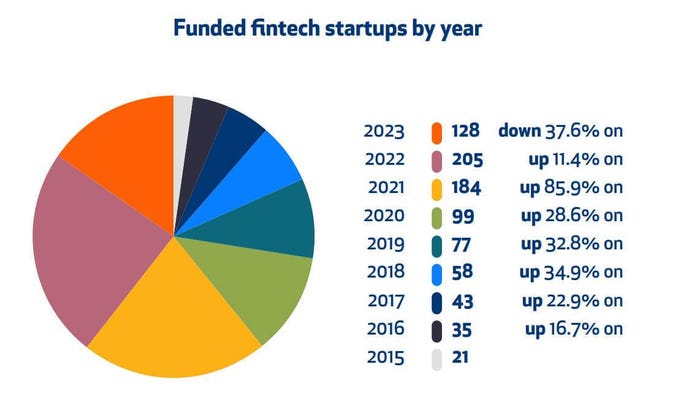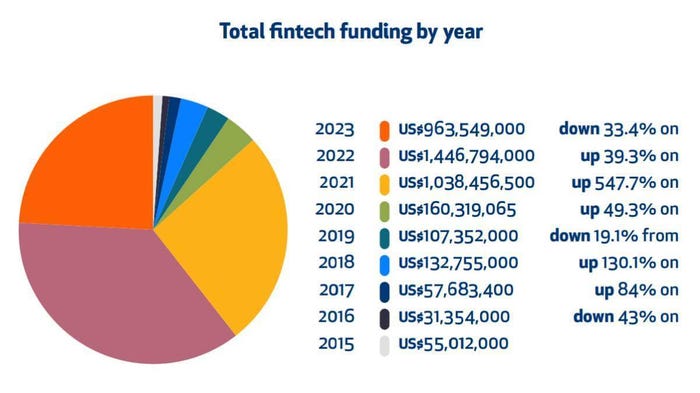Understanding African fintech startup failuresUnderstanding African fintech startup failures
Connecting Africa correspondent Chiti Mbizule Mutati investigates the reasons behind the high failure rate of African fintech startups, citing the importance of funding, policy and regulation in the sector.

The rise of the African fintech sector has had a positive impact on financial inclusion, helping to give individuals and small and medium sized enterprises (SMEs) more access to mainstream financial services.
Although the exponential growth of fintech has not been without risks and challenges, it has arguably also driven a vast improvement in the lives of people on the continent.
However, the journey for many African fintech entrepreneurs has not been an easy one by any means. In fact, according to research by Boston Consulting Group, only 8% of startups make it to Series B funding stage, with many shuttering before their potential can even be reached.
Last year alone saw the demise of fintech startups such as Ghanaian payments interoperability platform Dash, Nigerian financial services platform Pivo, British/Nigerian cross-border remittance aggregation platform Zazuu and Kenyan business-to-business ecommerce platform Zumi.
A number of Nigerian cryptocurrency platforms also shut their doors last year including Lazerpay, Bundle Africa and Vibra.
This year has so far seen the closure of Nigerian wealthtech startup Cova and Nigerian fintech Thepeer, while Kenyan mobile commerce platform Copia Global laid off over 1,000 employees in May and is facing liquidation.
This has raised questions around the challenges plaguing the region's fintech startups, as well as the regulatory and policy environment and whether it is supportive enough for fintech's to thrive.
Myriad reasons for startup failure, but funding tops the list
According to Danielle du Toit, the chief operating officer of the Fintech Association of South Africa, African fintech startups face many challenges.
These include infrastructure weakness and deficits, shortages of talent for key roles within startups, as well as high costs and expenses. However, the most significant of these remains access to funding.
Funding challenges and high financing costs for entrepreneurs are the main contributors to startup failures in the region as new companies grapple with limited sources of funding compared to other regions.
According to Disrupt Africa, this worsened on the back of a global shortage of capital in 2023, placing the region in a "funding winter".

(Source: Disrupt Africa The African Tech Startups Funding Report 2023)
Du Toit noted that entrepreneurs face limited funding opportunities from sources like venture capital and private equity funds, owing to the latter's perceptions of high risks associated with investing in the region.
Barry Ryan, an Africa-based fintech investor, added that the high borrowing costs from traditional financial institutions is also a challenge. With these institutions, entrepreneurs are often required to provide higher levels of collateral and accept higher interest rates.
"In the West, the availability of and access to funds is much easier. One can borrow against an asset, such as a home equity loan, whereas this is prohibitively expensive in Africa," Ryan stated.

(Source: Disrupt Africa The African Tech Startups Funding Report 2023)
Forward-looking policy and collaboration are needed
African fintech companies have been successful in funding rounds, however. According to the World Economic Forum, 92% of Africa's investment in tech is won by just four countries: Nigeria, Egypt, Kenya and South Africa.
These four countries are seen as the forerunners in the region's fintech journey. Du Toit labelled them as "the usual suspects," highlighting the four, along with Rwanda, for their progressive policies and strong political will for tech startups.
Du Toit believes that in these countries, government support for the tech sector has been in the form of the establishment of initiatives such as technology hubs, incubators and accelerators as well as a general commitment towards encouraging tech ecosystems that support the innovation, collaboration and growth of startups.
"It is not a question of what they do differently but rather a question of focus. They have put a lot of focus on driving innovation within start up environments and enabling growth… the passion lies in seeking growth and enabling it. That is the secret," explained Du Toit.
The region's established financial services firms and tech giants are also taking a more active role in the sector, ranging from investments in fintechs and partnerships to the development of accelerator hubs.
Notably, Visa opened its first African innovation hub in Kenya in 2022, going on to launch its fintech accelerator program on the continent in 2023.
Mastercard, meanwhile, has been active in the fintech space, crowning this with its August 2024 partnership with Scale, an issuer orchestration partner, to reduce barriers to market for payment-focused ventures in Africa and the Middle East.
Ryan also looks positively on open banking as a means of catalyzing the sector and promoting longevity of fintech startups.
This is an initiative whereby financial institutions open their application programing interfaces (APIs) to third parties.
Ryan believes such moves can encourage development in the African fintech market, with solutions which are adequately tailored to the needs of the market.
Regulation's role in supporting fintechs
Regulatory compliance can also pose a major hurdle for many startups as they navigate regulatory and policy uncertainty in the countries in which they operate.
More African policymakers and regulators are engaging with a range of approaches aimed at creating an enabling regulatory environment.
"Regulations are important to protect the market and provide guide rails for startups. However, early regulation may stifle the emergence of new companies, particularly in the tech sector," Ryan said.
In this regard, fintech sandboxes can provide some relief. These are focused on providing a conducive environment with regulatory oversight for startups to test new products, services or solutions.
The sandboxes provide temporary flexibility for these ventures to build their operations, whilst promoting safe and ethical innovation, consumer protection, and reducing the risk of non-compliance, for example.

Experts say that African startups face challenges like infrastructure weakness and deficits, shortages of talent for key roles, and high costs and expenses.(Source: Image by freepik)
Some countries have even gone a step further, creating standalone legislation in the form of Startup Acts. In 2018 Tunisia became the first country to introduce a Startup Act, followed by Senegal in 2019.
Since then, more countries have followed suit such as Nigeria and the Democratic Republic of Congo while Rwanda, Ghana and Ethiopia, for example, have begun preparing this legislation.
Ryan urged regulators to also focus on easing "friction points" which can emerge when starting a business, such as business registration processes.
"By addressing these gaps, African countries can create a more robust and inclusive environment where startups can thrive and contribute significantly to economic growth," du Toit added.
African fintech future still burns bright
Overall, the outlook for Africa's fintech sector is highly positive, with the rapid growth of a very youthful and increasingly tech-savvy population as the main driver.
In addition to providing a large customer target base, the region's youth can also provide a talent pool for startups – if the fundamentals around education and tech skills development can be addressed.
Du Toit also highlighted tailwinds from trends such as the rise of tech-enabled sectors, pan-African expansions, impact investing and increased collaboration between corporate giants and startup voices.
However, more funds will need to enter the space, and Ryan discouraged them from employing rigid approaches to their metrics for funding.
Funds should consider "Africa's challenges and opportunities and should not apply the precise models used in the West," he said.
"We all know about the global businesses that dominate the tech space, but these do not necessarily address African opportunities," Ryan continued.
Du Toit said that the individuals who comprise the African startup scene display "an entrepreneurial spirit that was last seen during the last disruption when the Internet boomed into the economy."
"There are so many opportunities for startups to rise to the occasion… startups will make it in Africa if they keep on keeping on. Hard work and patience will pay off," she concluded.
— Chiti Mbizule Mutati, Correspondent, special to Connecting Africa


_(1).jpg?width=700&auto=webp&quality=80&disable=upscale)

.jpg?width=700&auto=webp&quality=80&disable=upscale)
_(1).jpg?width=700&auto=webp&quality=80&disable=upscale)
.jpg?width=700&auto=webp&quality=80&disable=upscale)
.jpg?width=700&auto=webp&quality=80&disable=upscale)
.jpg?width=700&auto=webp&quality=80&disable=upscale)
.jpg?width=700&auto=webp&quality=80&disable=upscale)
.jpg?width=800&auto=webp&quality=80&disable=upscale)


.jpg?width=700&auto=webp&quality=80&disable=upscale)